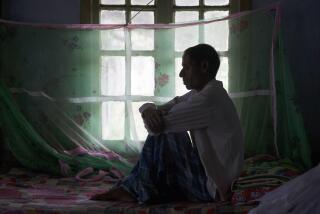Board Asks for Study on Closing Gay Bathhouses
- Share via
The Los Angeles County Board of Supervisors, expressing growing alarm at the rising number of AIDS cases, on Tuesday ordered public health officials and county lawyers to study whether and how to close down gay bathhouses.
Following the lead of New York state, which last week moved to close those bathhouses that promote the sort of “high-risk” sexual activities that could spread the fatal disease, the board approved a motion by Supervisor Pete Schabarum directing its attorneys and the Public Health Commission to return in two weeks with recommendations on what to do about bathhouses in the county.
More than 600 persons have died of acquired immune deficiency syndrome in the county, according to Robert Gates, the county Health Services Department director, and deaths are occurring at the rate of two a day. A total of 1,191 AIDS cases have been confirmed in the county as of Sept. 30.
Ninety-five percent of the cases have involved homosexual or bisexual men, and experts have warned that the disease can be transmitted through the kinds of sexual activities often engaged in by promiscuous gays--particularly relations involving an exchange of bodily fluids. As a result, attention has focused on gay bathhouses, health club-like facilities where some homosexual men meet for sexual relations.
Schabarum’s Statements
In a statement released Monday, Schabarum said, “We should close businesses which promote the spread of the deadly disease.”
But on Tuesday, Schabarum acknowledged that there are many legal questions involved in regulating the bathhouses and he said he is not calling for their closure.
Reading from a county health department report, which noted that many of the 16 bathhouses operating in the county offer private rooms and that some also maintain bondage rooms equipped with chains and leather restraints, Schabarum suggested that the businesses may be allowing high-risk kinds of sexual activity.
“You don’t have to be too smart to relate one circumstance to another,” he said.
The department report, prepared at the board’s direction, also noted that Health Code violations were found last month at 14 of the bathhouses. However, the violations--such things as improperly chlorinated pools and poor drainage on floors--would not be related to the spread of AIDS, Gates said.
In the past, county health officials and a joint City-County AIDS Task Force have said closing the bathhouses would not curb the problem of gays engaging in high-risk sexual activities because new businesses or meeting spots would spring up.
Health department officials have argued that what is needed are more educational programs for gays on how to avoid high-risk kinds of sexual activity. Indeed, the City-County AIDS Task Force has encouraged using the bathhouses as a means of distributing information to gays who may be at risk.
Peter Scott, board chairman of AIDS Project Los Angeles, the area’s largest AIDS support group, said in a statement Tuesday that the organization supports the department’s position. The organization “sees no reason for the mentioned businesses to be closed down.”
Jerry Goulet, secretary of the Los Angeles County Bath Owners Assn., also said any plan to close the baths would not prevent the spread of AIDS.
“I don’t think it’s going to serve any good because it’s not going to address the medical issue,” Goulet said.
Hahn for Closure
But Supervisor Kenneth Hahn said, “If bathhouses are a source of death and contagion, then we should shut them down.”
Supervisor Ed Edelman, whose downtown-to-Westside district includes many of the bathhouses, cautioned his colleagues to “carefully analyze the problem and not just go for the easiest solution.”
“I don’t believe the bathhouses themselves are the cause of the problem,” Edelman said. “The problem is the conduct of the people.”
Since the AIDS epidemic has become highly publicized, patronage at the bathhouses has declined sharply and several in Los Angeles have shut down.
In San Francisco last year, that city’s efforts to shut down the bathhouses as a health threat were blocked by a Superior Court judge. But the judge did require bathhouse owners to remove doors from private rooms and assign employees to monitor sexual activities of patrons. Many of the bathhouses closed down shortly after the judge’s order and business fell off at others.
In New York last week, state officials gave local officials the authority to shut down those bathhouses that create a “public nuisance” by encouraging high-risk sexual activity, including oral sex.
New York Gov. Mario Cuomo and New York City Mayor Edward Koch supported the action. Koch said uniformed and undercover health inspectors will enter the city’s bathhouses to enforce the regulation.
Times staff writers Kevin Roderick and Ted Vollmer also contributed to this story.
More to Read
Sign up for Essential California
The most important California stories and recommendations in your inbox every morning.
You may occasionally receive promotional content from the Los Angeles Times.










